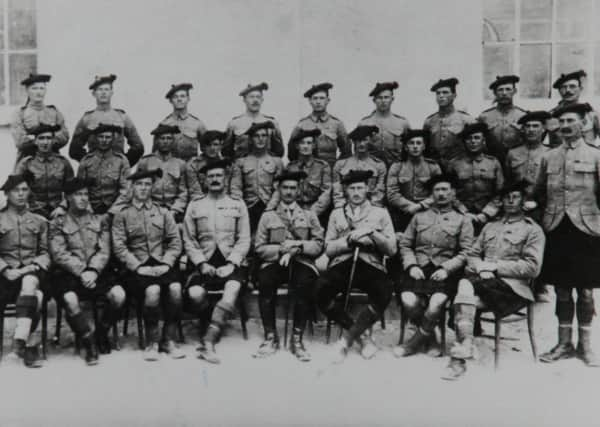Hidden for 100 years, Black Watch war story


Hundreds of pages containing the thoughts and observations of Lieutenant Colonel John Stewart, of the 2nd Battalion the Black Watch, were collected and donated to the Black Watch Castle and Museum in Perth in 1954.
The material could not be opened until this year, at Lt Col Stewart’s stipulation. They include accounts of battles, when there would be a change from “silence to pandemonium”.
Advertisement
Hide AdLt Col Stewart became commanding officer of the 2nd Battalion in 1916 and was in charge during the 1917 battle of Samarra in Mesopotamia – today’s Iraq.
He was commended for his regiment’s bravery as they defeated the Turks and became the first unit to enter Baghdad.
The museum’s archivist, Richard McKenzie, this week became the first person to open the files, which catalogue the sacrifice of thousands of young Scots who served with the Black Watch across the Middle East and beyond, battling Turkish and German forces and seizing Baghdad.
He said: “To be the first to open a collection of fantastic letters and memoirs was a real privilege. The collection seems to be made up of hundreds of letters to his family, particularly his wife, and some accounts from the battles that the 2nd Battalion took part in.”
Mr McKenzie added: “While we already had the brief official war history accounts of battles, we now have accounts from an actual eyewitness, which could provide new information. But the predominant thing that comes across most is that he was a loving family man, that he was quite simply worried about his wife and children.”
Little is known about Lt Col Stewart, but it is possible one of his immediate family members donated the files in 1954, perhaps after his death.
Advertisement
Hide AdMr McKenzie explained: “We don’t even know where and when he was born and where and when he died. His wife’s name is a mystery too, he only seems to refer to her as his ‘dearest and best’. It would be fantastic if one of his relatives hears about this and comes forward with more information.”
Volunteers are working with Mr McKenzie to study the documents. Once the collections have been read and preserved, they will be made available for the public to read in the near future.
Extracts from the diaries of Lt Col Stewart
Advertisement
Hide AdBritish Attack on the Tabsor System of Enemy Trenches, Mesopotamia, 19 September, 1918
“At zero hour on the 19th the artillery bombardment commenced. To us who had been waiting anxiously, it seemed as if some button had been pressed which discharged every gun on the 15-mile front. The change from silence to pandemonium was startling. Very little retaliatory fire came from the enemy. They seemed dazed with the volume of our fire and too much alarmed by the width of the attack to know what to do… and it was thus, with consummate ease that the Highlanders reached, and dealt with, their various objectives.”
“During the mopping-up process, a complete Turkish battery was discovered, the whole of the personnel having been destroyed by a single shell – horses lying harnessed up, and men at their guns, all dead.”
“Australian cavalry, many miles behind the original Turkish lines came upon an enemy plane with its occupants sitting beside it having lunch. Their surprise must have been great when our men galloped up and called on them to surrender, and the surprise of the Australians must have been greater still when they discovered that the staff officer had on him a secret dispatch direct from the Kaiser to the German Commander in Chief in Palestine.”
Stewart’s account of the Battle of Loos, 25th September 1915:
“For four days previous to the 25th, Loos and the neighbourhood had been very heavily shelled by our guns, morning, noon and night. The enemy were given no rest during this time, and it must have been a terrible time from their point of view. In our billets the buildings rocked and windows rattled without ceasing. The intense bombardment and the gas started at 5:50am punctually – I never heard such an infernal noise in all my life – every gun within miles seemed hammering above our heads.
Advertisement
Hide AdJust before the attack, the Germans sent some gas shells over; one dropped in the neighbourhood of our dugout, which made things rather unpleasant. The enemy’s machine guns got to work, and our men began to drop right and left, but they never wavered for one single second – on they went, line after line.”